The Best 10 Alternatives to SaferVPN (+ Pricing & Reviews)
Twingate Team
•
Jul 27, 2024

SaferVPN provides secure and private internet access by encrypting your online activities. While it offers robust features, it might not be the choice for everyone. This article explores the benefits and limitations of using SaferVPN for your online security needs.
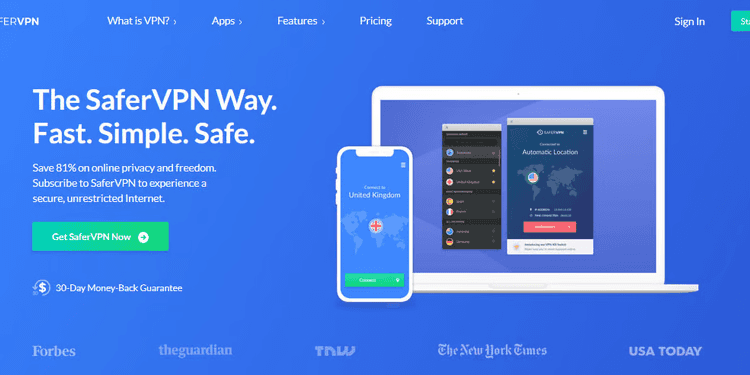
10 Alternatives to SaferVPN
1. Twingate
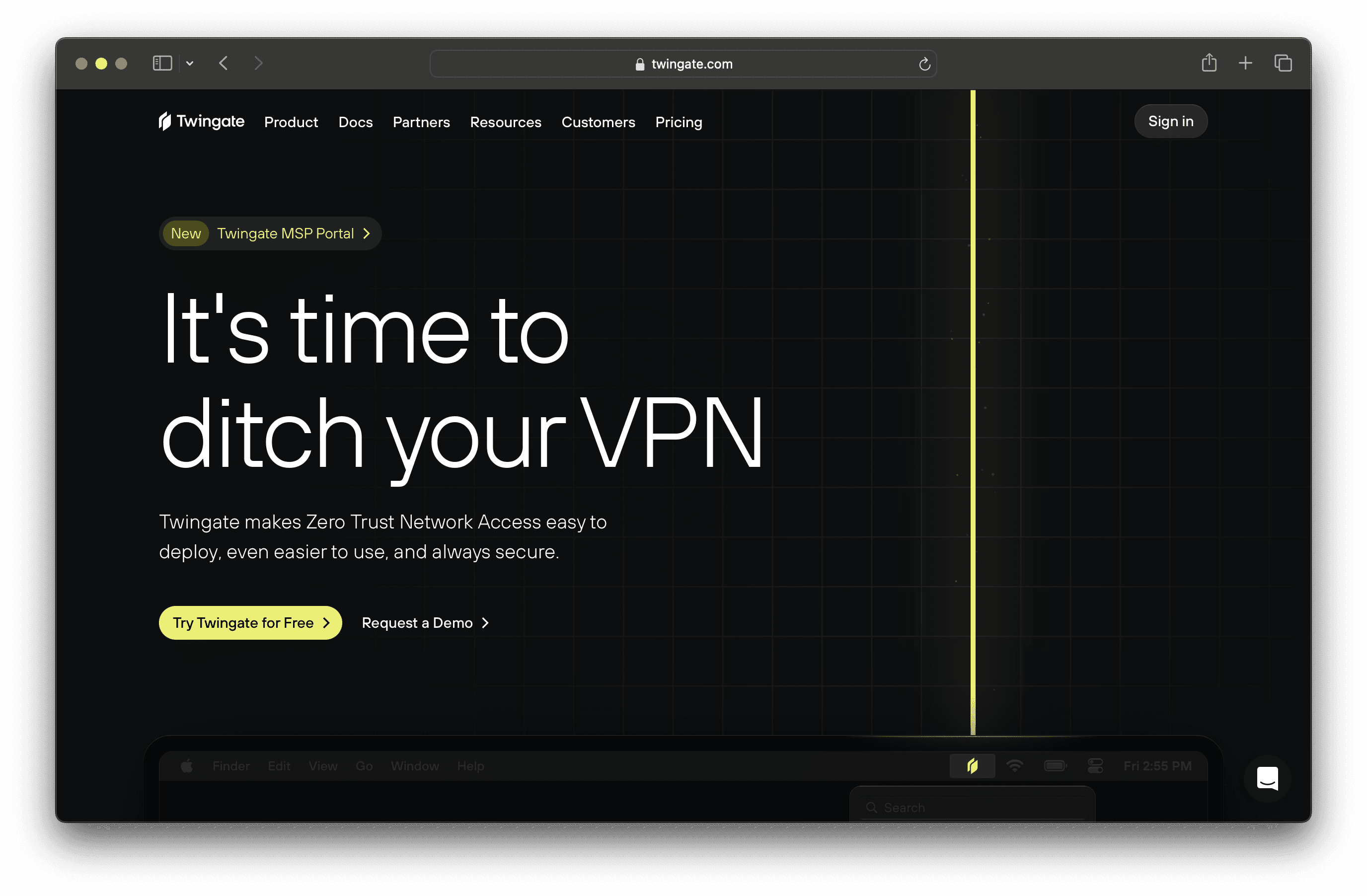
Twingate is a network security solution designed to replace traditional VPNs for remote access, offering a zero-trust security model and seamless deployment alongside existing infrastructure. With a focus on ease of use and scalability, Twingate aims to provide a secure and maintainable solution for businesses of all sizes.
Twingate Pricing
Starter: Free per user/month
Teams: $6 per user/month (monthly), $5 per user/month (yearly, 15% savings)
Business: $12 per user/month (monthly), $10 per user/month (yearly, 15% savings)
Enterprise: Custom pricing per user/month
Twingate Reviews
Twingate has an overall rating of 4.7 out of 5 stars based on 63 reviews. Users praise its ease of setup, high security, and excellent support. Check out more of our reviews here!
Pros and Cons of Twingate
Pros:
Enhanced Security: Twingate's zero trust model ensures that only authenticated users can access specific resources, minimizing the risk of unauthorized access.
Ease of Deployment: Setting up Twingate is straightforward and quick, often taking just minutes, which reduces the burden on IT teams.
High Performance: Users experience faster and more reliable connections compared to traditional VPNs, improving overall productivity.
Cons:
Initial Learning Curve: Non-technical users may find the initial setup and configuration challenging, despite the comprehensive documentation available.
Limited Market Awareness: Twingate is not as widely recognized as traditional VPN solutions, which could impact its adoption rate.
Marketing Efforts: Some users feel that Twingate's marketing could be improved to better communicate its benefits and features.
2. UH VPN
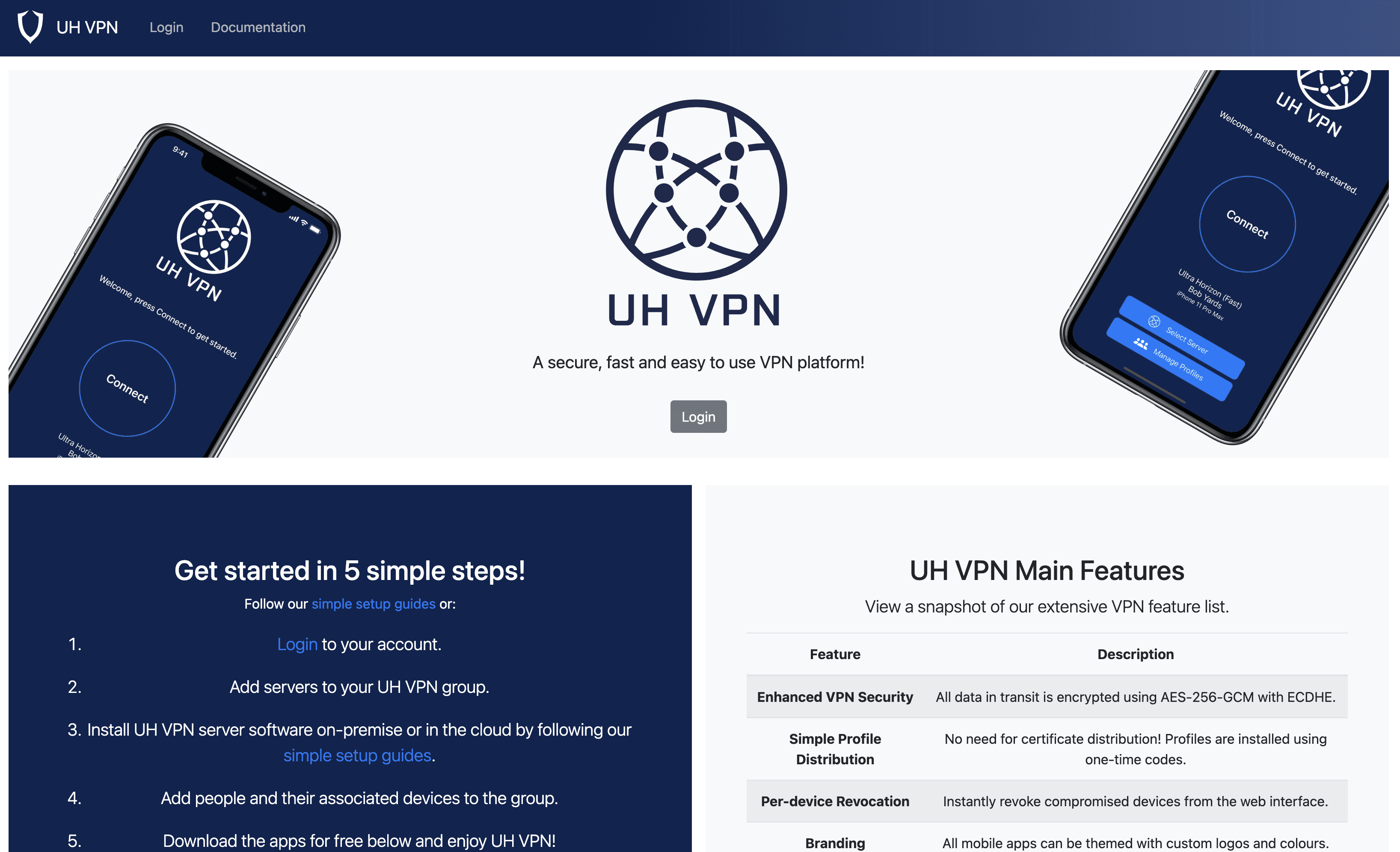
UH VPN is a secure, fast, and user-friendly VPN platform designed to provide enhanced security and ease of use. It offers features like simple profile distribution, per-device revocation, and custom cryptography, making it a reliable choice for both individuals and businesses seeking robust online protection.
UH VPN Pricing
UH VPN's pricing is not public. Contact their support for more info.
UH VPN Reviews
UH VPN has an overall rating of 4.0 out of 5 stars based on 5 reviews. Users praise its ease of use and fast service. Check out more of our reviews here!
Pros and Cons ofUH VPN
Pros:
Enhanced VPN Security: UH VPN uses AES-256-GCM with ECDHE for robust data encryption, ensuring top-notch security.
Simple Profile Distribution: Profiles are installed using one-time codes, eliminating the need for complex certificate distribution.
Per-device Revocation: Instantly revoke compromised devices from the web interface, enhancing security management.
Cons:
Access Issues: Some users find it confusing to obtain credentials, which can hinder initial setup.
Connection Issues: Occasional connection and disconnection problems, potentially linked to the user's internet connection.
Price Information: Pricing is not listed publicly; users must contact sales for a quote, which can be inconvenient.
3. Todyl
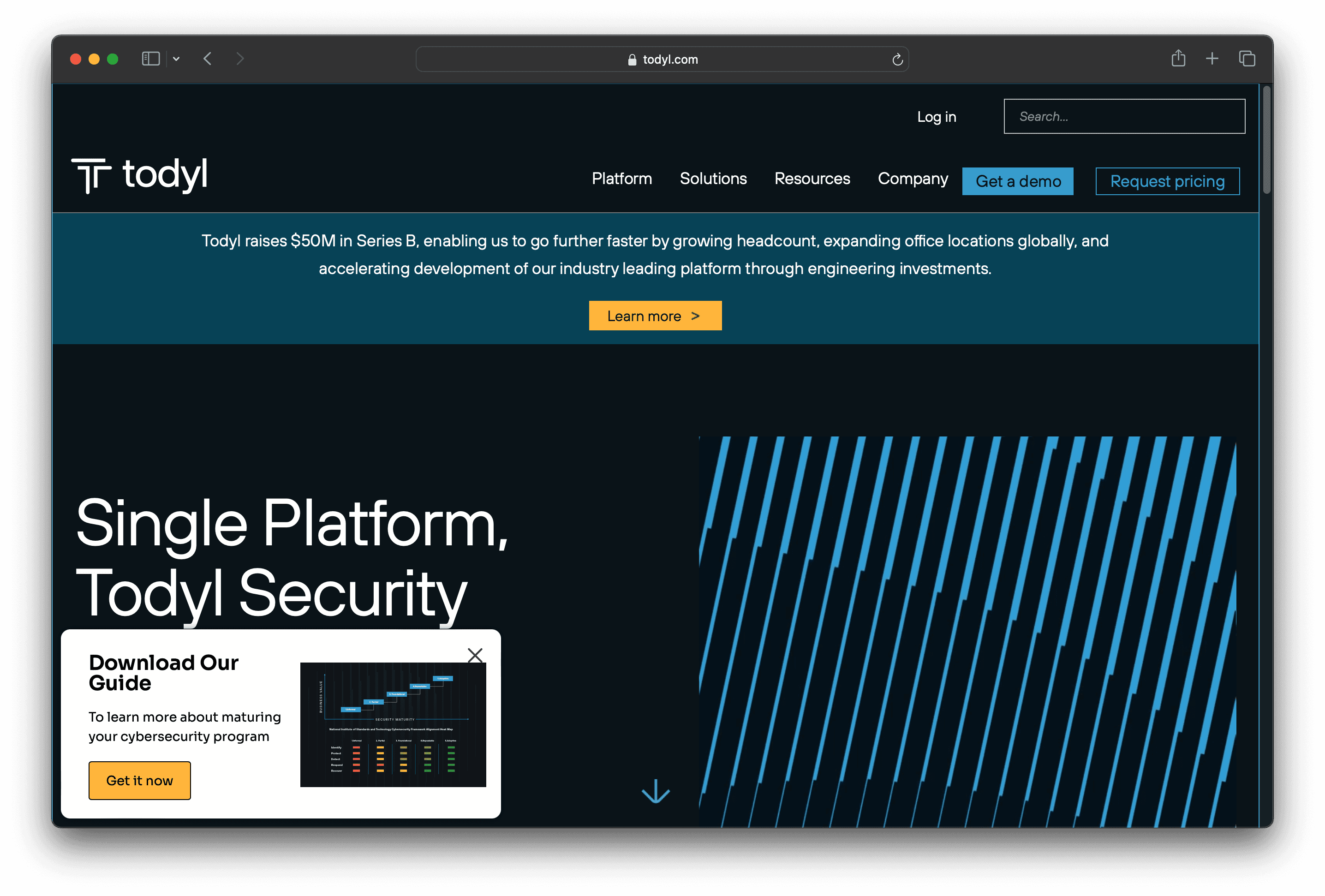
Todyl is a modular cybersecurity platform designed to provide comprehensive security solutions for businesses. It offers various modules like SASE, SIEM, and EDR/NGAV, which can be deployed independently or combined. Todyl aims to simplify security management with a single-agent platform, making it scalable and customizable for different needs.
Todyl Pricing
Todyl's pricing is not public. Contact their support for more info.
Todyl Reviews
Todyl has an overall rating of 4.7 out of 5 stars based on 41 reviews. Users appreciate its comprehensive protection and excellent customer service. Check out more of our reviews here!
Pros and Cons of Todyl
Pros:
Comprehensive Security: Todyl offers a consolidated, customizable cybersecurity platform, ensuring robust protection across various modules.
Modular Approach: Each module can be deployed independently, providing flexibility as cybersecurity needs evolve.
Single-Agent Platform: Streamlines deployments and reduces operational overhead, making it easier for IT teams to manage.
Cons:
Complexity for Small Businesses: The comprehensive nature might be overwhelming for smaller businesses with limited IT resources.
Potential Overhead: Initial setup and integration may require significant effort and resources, impacting smaller teams.
Dependence on Platform: Businesses might become heavily reliant on Todyl, making it challenging to switch to other solutions if needed.
4. UTunnel VPN
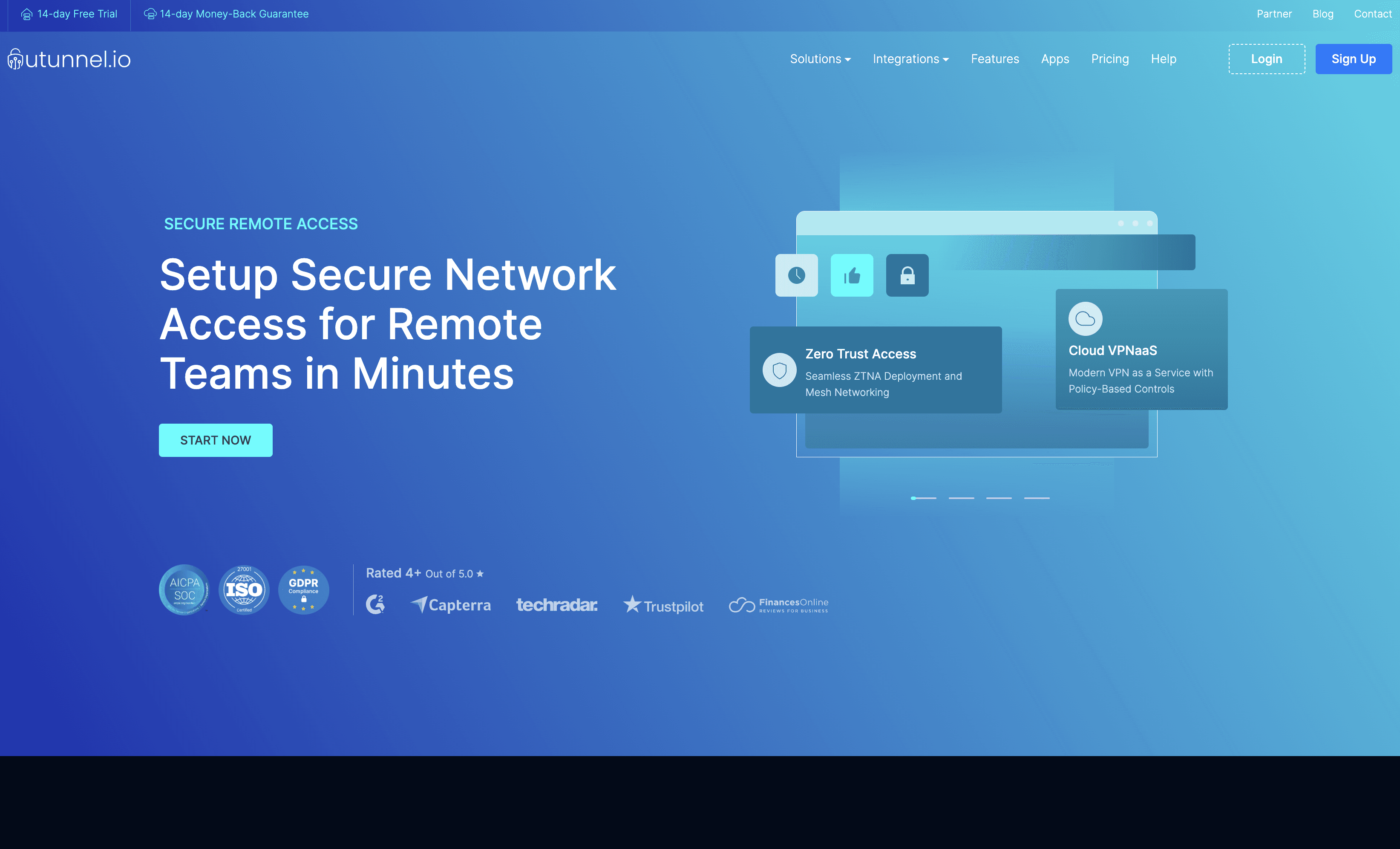
UTunnel VPN is a versatile solution offering secure remote access and zero trust network access (ZTNA) for businesses. It emphasizes ease of deployment, centralized management, and robust security features, making it suitable for organizations of all sizes. UTunnel aims to simplify network security while ensuring scalability and compliance.
UTunnel VPN Pricing
Basic Plan: $6.00 per month
Standard Plan: $8.00 per month
Bespoke plans available based on volume
UTunnel VPN Reviews
UTunnel VPN has an overall rating of 4.8 out of 5 stars based on 23 reviews. Users appreciate the ease of setup and secure access. Check out more of our reviews here!
Pros and Cons of UTunnel VPN
Pros:
Ease of Setup: Users with minimal technical knowledge can easily set up and manage remote access.
Flexible Deployment: Options to deploy VPN servers in the cloud or on-premise, catering to diverse business needs.
Zero Trust Access: Secure, policy-based access to business applications, ensuring robust security.
Cons:
Limited Free Trial: Only a 14-day free trial is offered, which may not be sufficient for thorough evaluation.
Potential Complexity: Despite being user-friendly, some features may still be complex for non-technical users.
Dependency on Cloud Providers: Performance and reliability may depend on the chosen cloud provider, affecting consistency.
5. IVPN
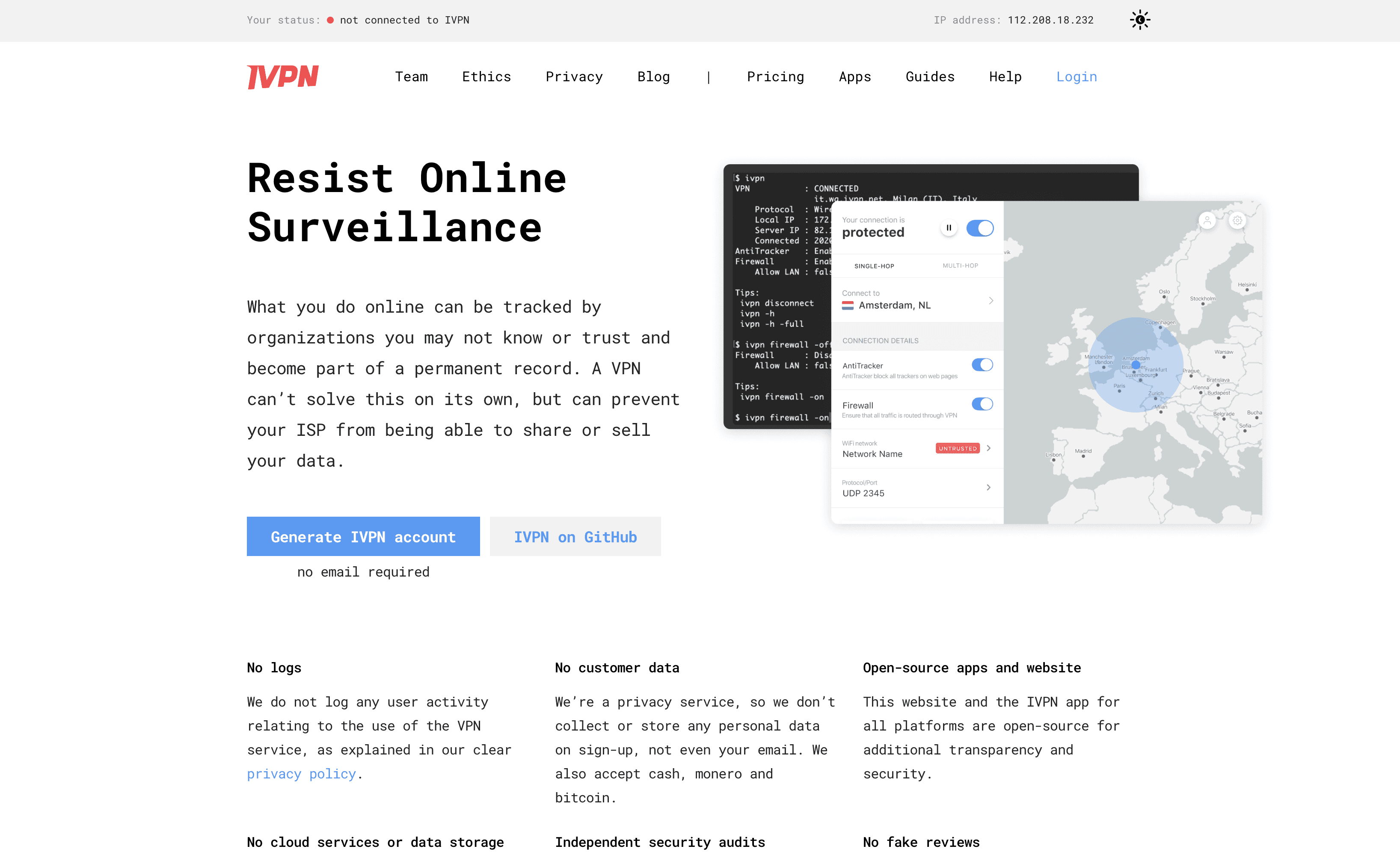
IVPN is a VPN service focused on privacy and security, designed to resist online surveillance. It offers features like no-logs policy, open-source apps, and multi-hop VPN routes. IVPN aims to provide transparent and ethical practices, ensuring robust protection for users seeking to safeguard their online activities.
IVPN Pricing
IVPN Standard: 1 Week: $2, 1 Month: $6, 1 Year: $60, 2 Years: $100, 3 Years: $140
IVPN Pro: 1 Week: $4, 1 Month: $10, 1 Year: $100, 2 Years: $160, 3 Years: $220
IVPN Reviews
IVPN has an overall rating of 4.2 out of 5 stars based on 12 reviews. Users appreciate its ease of use and strong security features. Check out more of our reviews here!
Pros and Cons of IVPN
Pros:
No Logs: IVPN does not log any user activity, ensuring complete privacy.
Open-Source: Both the website and the IVPN app are open-source, enhancing transparency and security.
Multi-Hop Connection: Supports routing through multiple servers for added security.
Cons:
Expensive: Higher subscription fees compared to other VPN services.
Manual Server Switching: Users need to disconnect from one server before connecting to another, which can be inconvenient.
Limited Server Count: Fewer servers compared to some competitors.
6. Cato Networks
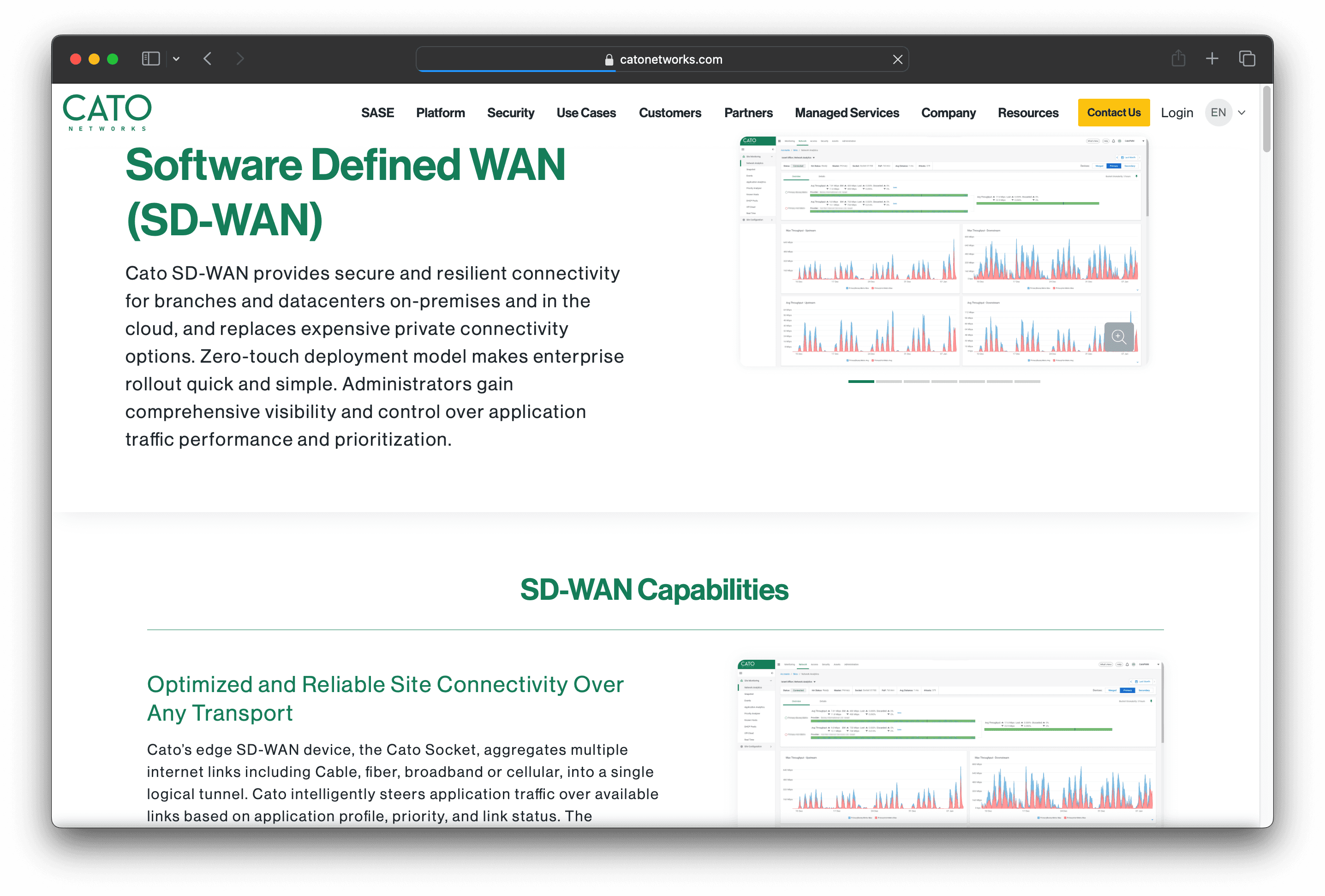
Cato Networks offers a Secure Access Service Edge (SASE) platform that integrates networking and security into a single cloud-native service. It provides global private backbone connectivity, threat prevention, data protection, and unified management, aiming to simplify and secure network operations for businesses of all sizes.
Cato Networks Pricing
Cato Networks' pricing is not public. Contact their support for more info.
Cato Networks Reviews
Cato Networks has an overall rating of 4.4 out of 5 stars based on 73 reviews. Users appreciate the centralized console and ease of use. Check out more of our reviews here!
Pros and Cons of Cato Networks
Pros:
Comprehensive SASE Platform: Cato Networks offers a fully converged, cloud-native suite of threat prevention and data protection capabilities.
Global Private Backbone: Ensures optimized and secure traffic flow with multiple on-ramp options, enhancing network performance.
AI/ML Integration: Utilizes AI/ML models for threat intelligence, incident detection, and response, providing advanced security measures.
Cons:
Complexity: The comprehensive nature of the platform might be overwhelming for smaller organizations or those with limited IT resources.
Dependency on Cloud: As a cloud-native solution, it may not be suitable for organizations with strict on-premises requirements or unreliable internet connectivity.
Learning Curve: The advanced features and capabilities might require significant training and adaptation for IT teams.
7. AWS VPN
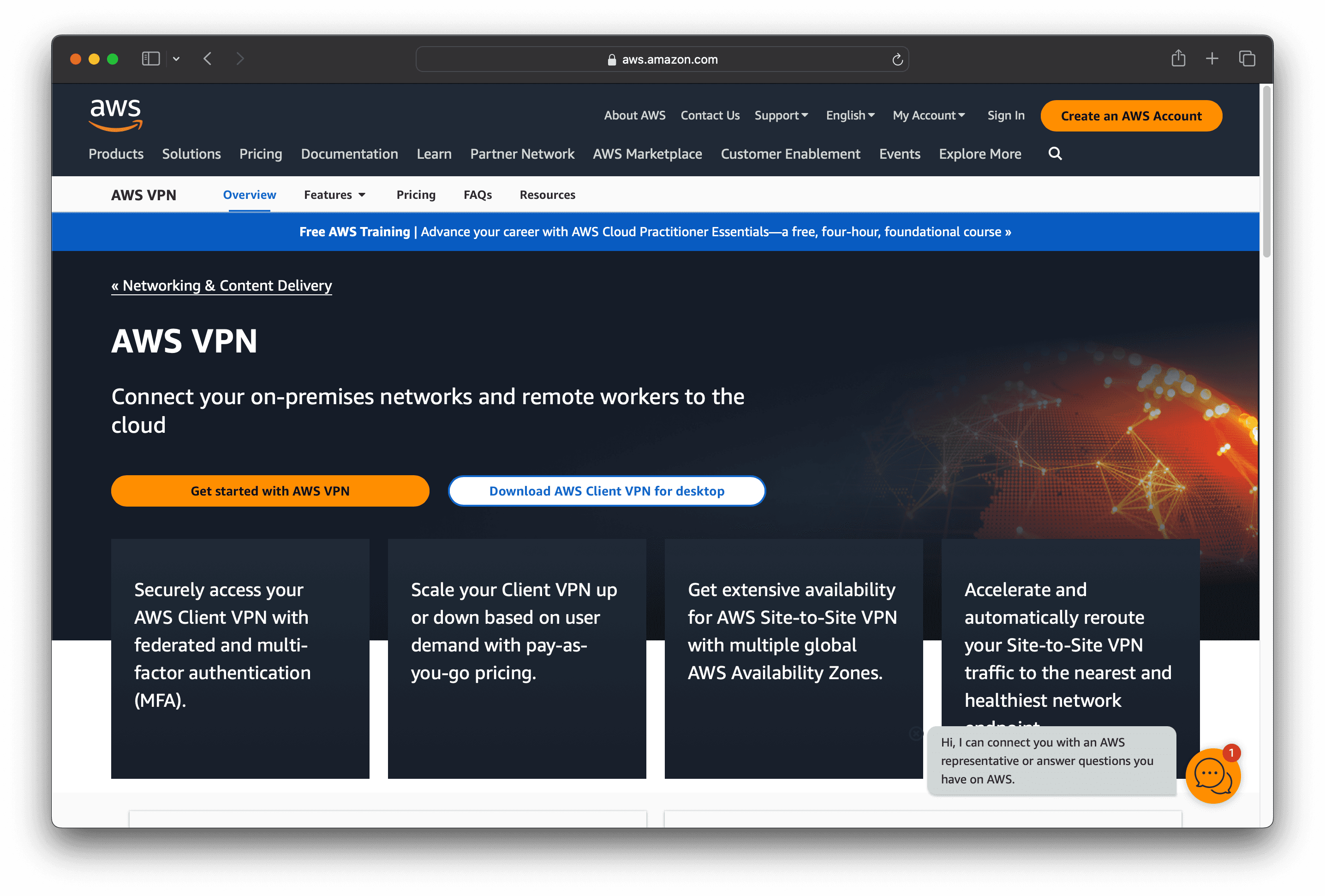
AWS VPN is a service that securely connects on-premises networks and remote workers to the AWS cloud. It includes AWS Client VPN and AWS Site-to-Site VPN, offering scalable, high-availability connections without the need for hardware installations. AWS VPN aims to simplify secure cloud access for businesses.
AWS VPN Pricing
Site-to-Site VPN connection fee: $0.05 per hour
Data transfer out fee: $0.09 per GB (first 100 GB free)
AWS Global Accelerator hourly fee: $0.025 per Global Accelerator per hour
Accelerated Site-to-Site VPN Data Transfer Premium fee: $0.015 per GB
AWS Client VPN endpoint association: $0.10 per hour
AWS Client VPN connection: $0.05 per hour
AWS VPN Reviews
AWS VPN has an overall rating of 4.6 out of 5 stars based on 21 reviews. Users appreciate its security and ease of use. Check out more of our reviews here!
Pros and Cons of AWS VPN
Pros:
Secure Access: Ensures secure connections for remote workers and on-premises networks, safeguarding sensitive data.
Scalability: Automatically scales up or down based on user demand, eliminating the need to estimate remote user numbers.
High Availability: Offers extensive availability across different regions, ensuring reliable connectivity.
Cons:
Complex Configuration: Setting up and managing VPN connections can be complex for users unfamiliar with networking.
Cost: Depending on usage, costs can add up, especially for large-scale deployments.
Internet Dependency: Performance and reliability are dependent on the quality of the internet connection.
8. Netbird
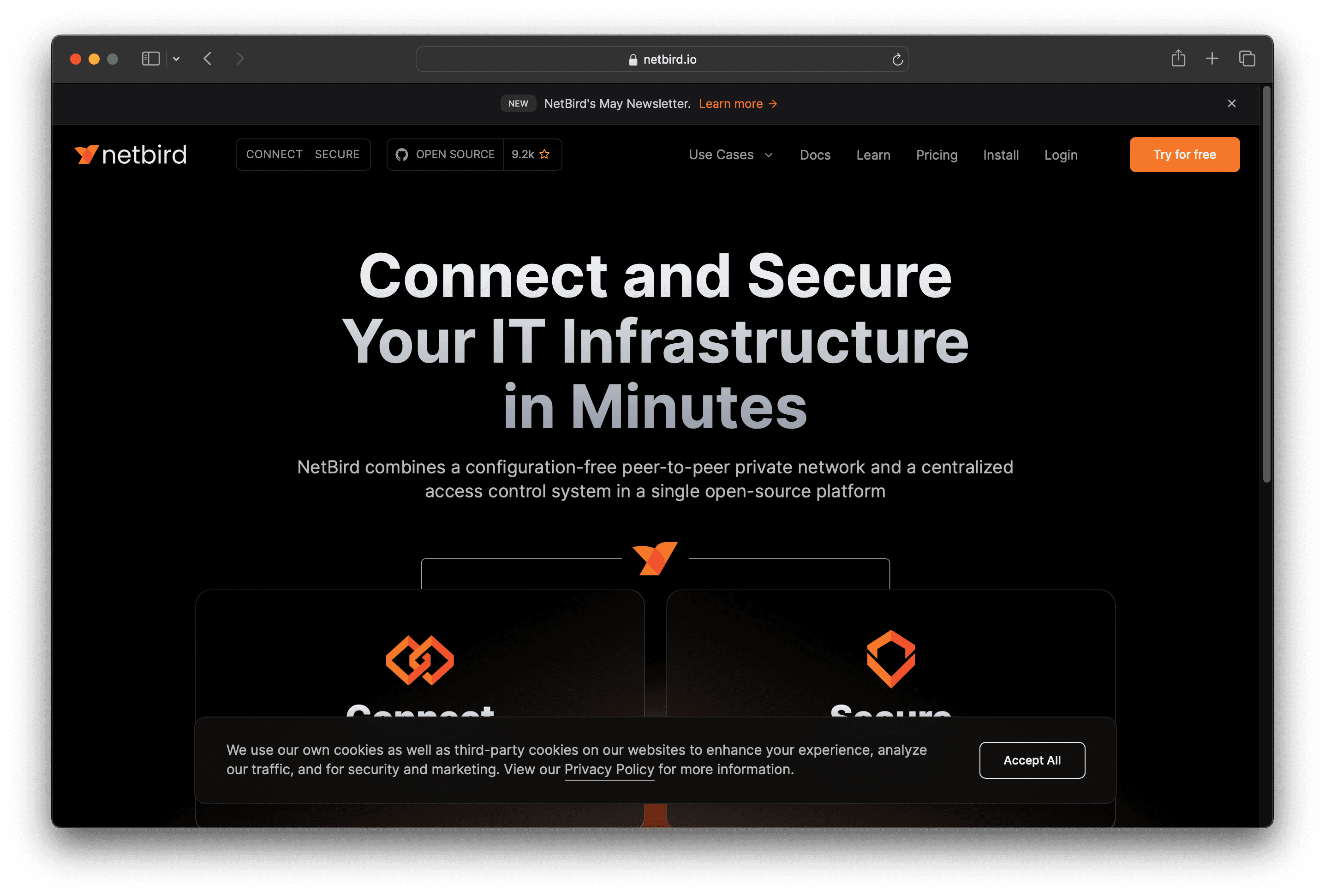
NetBird is an open-source platform designed to connect and secure IT infrastructure quickly and efficiently. It offers a high-performance peer-to-peer network based on WireGuard® and enterprise-grade security. With a configuration-free setup and centralized access control, NetBird simplifies network management for teams worldwide.
Netbird Pricing
Free Plan: $0 per user/month
Team Plan: $5 per user/month
Business Plan: $12 per user/month
Enterprise Plan: Custom pricing
MSP Plan: Custom pricing
Netbird Reviews
NetBird has an overall rating of 5.0 out of 5 stars based on 1 review. Users appreciate its ease of installation and open-source nature. Check out more of our reviews here!
Pros and Cons of Netbird
Pros:
Easy Installation: Users can set up NetBird quickly without needing extensive technical knowledge.
Free Licensing: Offers a free plan, making it accessible for small teams and startups.
High-Performance Network: Utilizes WireGuard® for efficient and fast network performance.
Cons:
Dependency on WireGuard®: Any issues with WireGuard® could impact NetBird's performance.
Learning Curve: Users unfamiliar with peer-to-peer networks might face initial challenges.
Open-Source Nature: May face challenges with consistent updates and support compared to proprietary solutions.
9. Palo Alto Networks
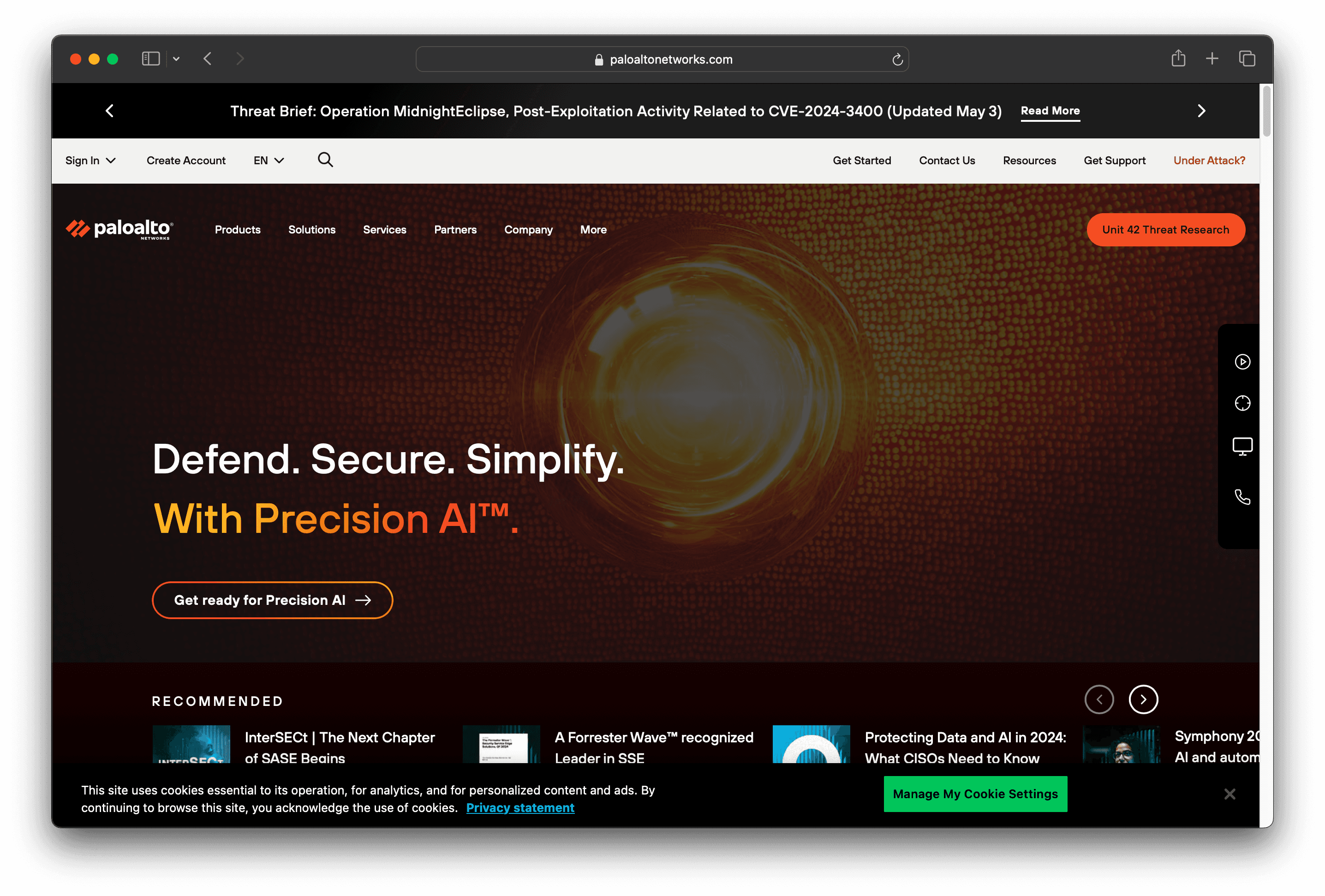
Palo Alto Networks is a cybersecurity company offering AI-driven security solutions. Their Precision AI™ enhances threat detection and remediation, while their Zero Trust network security platform ensures robust protection. Designed for seamless integration, Palo Alto Networks aims to simplify and secure digital environments for businesses of all sizes.
Palo Alto Networks Pricing
Palo Alto Networks's pricing is not public. Contact their support for more info.
Palo Alto Networks Reviews
Palo Alto Networks has an overall rating of 4.4 out of 5 stars based on 208 reviews. Users appreciate its strong security features and scalability. Check out more of our reviews here!
Pros and Cons of Palo Alto Networks
Pros:
AI-Powered Security: Precision AI enhances real-time threat detection and prevention, ensuring robust protection.
Comprehensive Solutions: Offers extensive security options, including network, cloud, and AI-driven operations.
Industry Recognition: Highly regarded by Forrester and Gartner, validating its strong market position.
Cons:
Complexity: The broad range of products can be overwhelming, complicating implementation and management.
Cost: High-end solutions may be expensive, posing a barrier for smaller organizations.
Resource Intensive: Requires significant resources and expertise, challenging for limited IT staff.
10. Perimeter 81
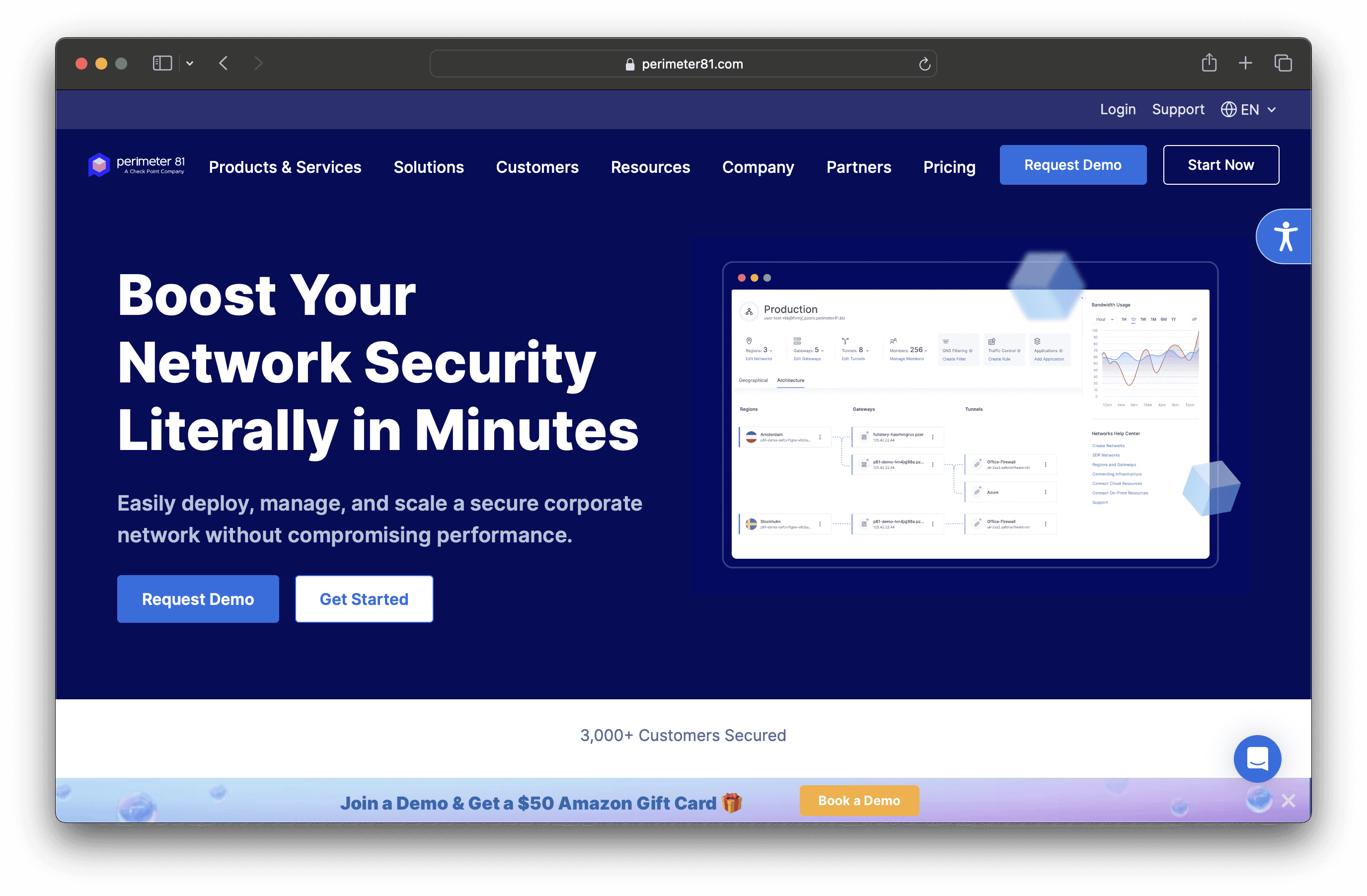
Perimeter 81 is a network security solution offering a Secure Access Service Edge (SASE) platform. It integrates networking and security into a single cloud-native service, emphasizing ease of use, robust security, and quick deployment. Designed for businesses of all sizes, Perimeter 81 aims to simplify secure access and network management.
Perimeter 81 Pricing
Essentials: +$50/mo per gateway, minimum 10 users
Premium: +$50/mo per gateway, minimum 10 users
Premium Plus: +$50/mo per gateway, minimum 20 users
Enterprise: Custom pricing, minimum 50 users
Perimeter 81 Reviews
Perimeter 81 has an overall rating of 4.4 out of 5 stars based on 208 reviews. Users appreciate its strong security features and scalability. Check out more of our reviews here!
Pros and Cons of Perimeter 81
Pros:
Robust Protection: Offers comprehensive security features like Private Access and Internet Access, ensuring data safety.
Quick Deployment: Can be set up and secured in under an hour, minimizing downtime.
Cost-Effective: Eliminates the need for hardware and maintenance, reducing overall expenses.
Cons:
Complexity for Small Businesses: The extensive range of features might be overwhelming for smaller organizations.
Cost Transparency: Actual pricing details are not provided, which could be a concern for budget-conscious users.
Internet Dependency: Requires reliable internet connectivity, which might be a limitation in areas with poor infrastructure.
Looking to secure your technical infrastructure?
Twingate offers granular access controls and deployment automations to protect your VPC environment. By leveraging Zero Trust security tools, Twingate ensures that private resources and internet traffic remain secure in the modern work landscape. Try Twingate for Free today!
Rapidly implement a modern Zero Trust network that is more secure and maintainable than VPNs.
The Best 10 Alternatives to SaferVPN (+ Pricing & Reviews)
Twingate Team
•
Jul 27, 2024

SaferVPN provides secure and private internet access by encrypting your online activities. While it offers robust features, it might not be the choice for everyone. This article explores the benefits and limitations of using SaferVPN for your online security needs.

10 Alternatives to SaferVPN
1. Twingate

Twingate is a network security solution designed to replace traditional VPNs for remote access, offering a zero-trust security model and seamless deployment alongside existing infrastructure. With a focus on ease of use and scalability, Twingate aims to provide a secure and maintainable solution for businesses of all sizes.
Twingate Pricing
Starter: Free per user/month
Teams: $6 per user/month (monthly), $5 per user/month (yearly, 15% savings)
Business: $12 per user/month (monthly), $10 per user/month (yearly, 15% savings)
Enterprise: Custom pricing per user/month
Twingate Reviews
Twingate has an overall rating of 4.7 out of 5 stars based on 63 reviews. Users praise its ease of setup, high security, and excellent support. Check out more of our reviews here!
Pros and Cons of Twingate
Pros:
Enhanced Security: Twingate's zero trust model ensures that only authenticated users can access specific resources, minimizing the risk of unauthorized access.
Ease of Deployment: Setting up Twingate is straightforward and quick, often taking just minutes, which reduces the burden on IT teams.
High Performance: Users experience faster and more reliable connections compared to traditional VPNs, improving overall productivity.
Cons:
Initial Learning Curve: Non-technical users may find the initial setup and configuration challenging, despite the comprehensive documentation available.
Limited Market Awareness: Twingate is not as widely recognized as traditional VPN solutions, which could impact its adoption rate.
Marketing Efforts: Some users feel that Twingate's marketing could be improved to better communicate its benefits and features.
2. UH VPN

UH VPN is a secure, fast, and user-friendly VPN platform designed to provide enhanced security and ease of use. It offers features like simple profile distribution, per-device revocation, and custom cryptography, making it a reliable choice for both individuals and businesses seeking robust online protection.
UH VPN Pricing
UH VPN's pricing is not public. Contact their support for more info.
UH VPN Reviews
UH VPN has an overall rating of 4.0 out of 5 stars based on 5 reviews. Users praise its ease of use and fast service. Check out more of our reviews here!
Pros and Cons ofUH VPN
Pros:
Enhanced VPN Security: UH VPN uses AES-256-GCM with ECDHE for robust data encryption, ensuring top-notch security.
Simple Profile Distribution: Profiles are installed using one-time codes, eliminating the need for complex certificate distribution.
Per-device Revocation: Instantly revoke compromised devices from the web interface, enhancing security management.
Cons:
Access Issues: Some users find it confusing to obtain credentials, which can hinder initial setup.
Connection Issues: Occasional connection and disconnection problems, potentially linked to the user's internet connection.
Price Information: Pricing is not listed publicly; users must contact sales for a quote, which can be inconvenient.
3. Todyl

Todyl is a modular cybersecurity platform designed to provide comprehensive security solutions for businesses. It offers various modules like SASE, SIEM, and EDR/NGAV, which can be deployed independently or combined. Todyl aims to simplify security management with a single-agent platform, making it scalable and customizable for different needs.
Todyl Pricing
Todyl's pricing is not public. Contact their support for more info.
Todyl Reviews
Todyl has an overall rating of 4.7 out of 5 stars based on 41 reviews. Users appreciate its comprehensive protection and excellent customer service. Check out more of our reviews here!
Pros and Cons of Todyl
Pros:
Comprehensive Security: Todyl offers a consolidated, customizable cybersecurity platform, ensuring robust protection across various modules.
Modular Approach: Each module can be deployed independently, providing flexibility as cybersecurity needs evolve.
Single-Agent Platform: Streamlines deployments and reduces operational overhead, making it easier for IT teams to manage.
Cons:
Complexity for Small Businesses: The comprehensive nature might be overwhelming for smaller businesses with limited IT resources.
Potential Overhead: Initial setup and integration may require significant effort and resources, impacting smaller teams.
Dependence on Platform: Businesses might become heavily reliant on Todyl, making it challenging to switch to other solutions if needed.
4. UTunnel VPN

UTunnel VPN is a versatile solution offering secure remote access and zero trust network access (ZTNA) for businesses. It emphasizes ease of deployment, centralized management, and robust security features, making it suitable for organizations of all sizes. UTunnel aims to simplify network security while ensuring scalability and compliance.
UTunnel VPN Pricing
Basic Plan: $6.00 per month
Standard Plan: $8.00 per month
Bespoke plans available based on volume
UTunnel VPN Reviews
UTunnel VPN has an overall rating of 4.8 out of 5 stars based on 23 reviews. Users appreciate the ease of setup and secure access. Check out more of our reviews here!
Pros and Cons of UTunnel VPN
Pros:
Ease of Setup: Users with minimal technical knowledge can easily set up and manage remote access.
Flexible Deployment: Options to deploy VPN servers in the cloud or on-premise, catering to diverse business needs.
Zero Trust Access: Secure, policy-based access to business applications, ensuring robust security.
Cons:
Limited Free Trial: Only a 14-day free trial is offered, which may not be sufficient for thorough evaluation.
Potential Complexity: Despite being user-friendly, some features may still be complex for non-technical users.
Dependency on Cloud Providers: Performance and reliability may depend on the chosen cloud provider, affecting consistency.
5. IVPN

IVPN is a VPN service focused on privacy and security, designed to resist online surveillance. It offers features like no-logs policy, open-source apps, and multi-hop VPN routes. IVPN aims to provide transparent and ethical practices, ensuring robust protection for users seeking to safeguard their online activities.
IVPN Pricing
IVPN Standard: 1 Week: $2, 1 Month: $6, 1 Year: $60, 2 Years: $100, 3 Years: $140
IVPN Pro: 1 Week: $4, 1 Month: $10, 1 Year: $100, 2 Years: $160, 3 Years: $220
IVPN Reviews
IVPN has an overall rating of 4.2 out of 5 stars based on 12 reviews. Users appreciate its ease of use and strong security features. Check out more of our reviews here!
Pros and Cons of IVPN
Pros:
No Logs: IVPN does not log any user activity, ensuring complete privacy.
Open-Source: Both the website and the IVPN app are open-source, enhancing transparency and security.
Multi-Hop Connection: Supports routing through multiple servers for added security.
Cons:
Expensive: Higher subscription fees compared to other VPN services.
Manual Server Switching: Users need to disconnect from one server before connecting to another, which can be inconvenient.
Limited Server Count: Fewer servers compared to some competitors.
6. Cato Networks

Cato Networks offers a Secure Access Service Edge (SASE) platform that integrates networking and security into a single cloud-native service. It provides global private backbone connectivity, threat prevention, data protection, and unified management, aiming to simplify and secure network operations for businesses of all sizes.
Cato Networks Pricing
Cato Networks' pricing is not public. Contact their support for more info.
Cato Networks Reviews
Cato Networks has an overall rating of 4.4 out of 5 stars based on 73 reviews. Users appreciate the centralized console and ease of use. Check out more of our reviews here!
Pros and Cons of Cato Networks
Pros:
Comprehensive SASE Platform: Cato Networks offers a fully converged, cloud-native suite of threat prevention and data protection capabilities.
Global Private Backbone: Ensures optimized and secure traffic flow with multiple on-ramp options, enhancing network performance.
AI/ML Integration: Utilizes AI/ML models for threat intelligence, incident detection, and response, providing advanced security measures.
Cons:
Complexity: The comprehensive nature of the platform might be overwhelming for smaller organizations or those with limited IT resources.
Dependency on Cloud: As a cloud-native solution, it may not be suitable for organizations with strict on-premises requirements or unreliable internet connectivity.
Learning Curve: The advanced features and capabilities might require significant training and adaptation for IT teams.
7. AWS VPN

AWS VPN is a service that securely connects on-premises networks and remote workers to the AWS cloud. It includes AWS Client VPN and AWS Site-to-Site VPN, offering scalable, high-availability connections without the need for hardware installations. AWS VPN aims to simplify secure cloud access for businesses.
AWS VPN Pricing
Site-to-Site VPN connection fee: $0.05 per hour
Data transfer out fee: $0.09 per GB (first 100 GB free)
AWS Global Accelerator hourly fee: $0.025 per Global Accelerator per hour
Accelerated Site-to-Site VPN Data Transfer Premium fee: $0.015 per GB
AWS Client VPN endpoint association: $0.10 per hour
AWS Client VPN connection: $0.05 per hour
AWS VPN Reviews
AWS VPN has an overall rating of 4.6 out of 5 stars based on 21 reviews. Users appreciate its security and ease of use. Check out more of our reviews here!
Pros and Cons of AWS VPN
Pros:
Secure Access: Ensures secure connections for remote workers and on-premises networks, safeguarding sensitive data.
Scalability: Automatically scales up or down based on user demand, eliminating the need to estimate remote user numbers.
High Availability: Offers extensive availability across different regions, ensuring reliable connectivity.
Cons:
Complex Configuration: Setting up and managing VPN connections can be complex for users unfamiliar with networking.
Cost: Depending on usage, costs can add up, especially for large-scale deployments.
Internet Dependency: Performance and reliability are dependent on the quality of the internet connection.
8. Netbird

NetBird is an open-source platform designed to connect and secure IT infrastructure quickly and efficiently. It offers a high-performance peer-to-peer network based on WireGuard® and enterprise-grade security. With a configuration-free setup and centralized access control, NetBird simplifies network management for teams worldwide.
Netbird Pricing
Free Plan: $0 per user/month
Team Plan: $5 per user/month
Business Plan: $12 per user/month
Enterprise Plan: Custom pricing
MSP Plan: Custom pricing
Netbird Reviews
NetBird has an overall rating of 5.0 out of 5 stars based on 1 review. Users appreciate its ease of installation and open-source nature. Check out more of our reviews here!
Pros and Cons of Netbird
Pros:
Easy Installation: Users can set up NetBird quickly without needing extensive technical knowledge.
Free Licensing: Offers a free plan, making it accessible for small teams and startups.
High-Performance Network: Utilizes WireGuard® for efficient and fast network performance.
Cons:
Dependency on WireGuard®: Any issues with WireGuard® could impact NetBird's performance.
Learning Curve: Users unfamiliar with peer-to-peer networks might face initial challenges.
Open-Source Nature: May face challenges with consistent updates and support compared to proprietary solutions.
9. Palo Alto Networks

Palo Alto Networks is a cybersecurity company offering AI-driven security solutions. Their Precision AI™ enhances threat detection and remediation, while their Zero Trust network security platform ensures robust protection. Designed for seamless integration, Palo Alto Networks aims to simplify and secure digital environments for businesses of all sizes.
Palo Alto Networks Pricing
Palo Alto Networks's pricing is not public. Contact their support for more info.
Palo Alto Networks Reviews
Palo Alto Networks has an overall rating of 4.4 out of 5 stars based on 208 reviews. Users appreciate its strong security features and scalability. Check out more of our reviews here!
Pros and Cons of Palo Alto Networks
Pros:
AI-Powered Security: Precision AI enhances real-time threat detection and prevention, ensuring robust protection.
Comprehensive Solutions: Offers extensive security options, including network, cloud, and AI-driven operations.
Industry Recognition: Highly regarded by Forrester and Gartner, validating its strong market position.
Cons:
Complexity: The broad range of products can be overwhelming, complicating implementation and management.
Cost: High-end solutions may be expensive, posing a barrier for smaller organizations.
Resource Intensive: Requires significant resources and expertise, challenging for limited IT staff.
10. Perimeter 81

Perimeter 81 is a network security solution offering a Secure Access Service Edge (SASE) platform. It integrates networking and security into a single cloud-native service, emphasizing ease of use, robust security, and quick deployment. Designed for businesses of all sizes, Perimeter 81 aims to simplify secure access and network management.
Perimeter 81 Pricing
Essentials: +$50/mo per gateway, minimum 10 users
Premium: +$50/mo per gateway, minimum 10 users
Premium Plus: +$50/mo per gateway, minimum 20 users
Enterprise: Custom pricing, minimum 50 users
Perimeter 81 Reviews
Perimeter 81 has an overall rating of 4.4 out of 5 stars based on 208 reviews. Users appreciate its strong security features and scalability. Check out more of our reviews here!
Pros and Cons of Perimeter 81
Pros:
Robust Protection: Offers comprehensive security features like Private Access and Internet Access, ensuring data safety.
Quick Deployment: Can be set up and secured in under an hour, minimizing downtime.
Cost-Effective: Eliminates the need for hardware and maintenance, reducing overall expenses.
Cons:
Complexity for Small Businesses: The extensive range of features might be overwhelming for smaller organizations.
Cost Transparency: Actual pricing details are not provided, which could be a concern for budget-conscious users.
Internet Dependency: Requires reliable internet connectivity, which might be a limitation in areas with poor infrastructure.
Looking to secure your technical infrastructure?
Twingate offers granular access controls and deployment automations to protect your VPC environment. By leveraging Zero Trust security tools, Twingate ensures that private resources and internet traffic remain secure in the modern work landscape. Try Twingate for Free today!
Rapidly implement a modern Zero Trust network that is more secure and maintainable than VPNs.
The Best 10 Alternatives to SaferVPN (+ Pricing & Reviews)
Twingate Team
•
Jul 27, 2024

SaferVPN provides secure and private internet access by encrypting your online activities. While it offers robust features, it might not be the choice for everyone. This article explores the benefits and limitations of using SaferVPN for your online security needs.

10 Alternatives to SaferVPN
1. Twingate

Twingate is a network security solution designed to replace traditional VPNs for remote access, offering a zero-trust security model and seamless deployment alongside existing infrastructure. With a focus on ease of use and scalability, Twingate aims to provide a secure and maintainable solution for businesses of all sizes.
Twingate Pricing
Starter: Free per user/month
Teams: $6 per user/month (monthly), $5 per user/month (yearly, 15% savings)
Business: $12 per user/month (monthly), $10 per user/month (yearly, 15% savings)
Enterprise: Custom pricing per user/month
Twingate Reviews
Twingate has an overall rating of 4.7 out of 5 stars based on 63 reviews. Users praise its ease of setup, high security, and excellent support. Check out more of our reviews here!
Pros and Cons of Twingate
Pros:
Enhanced Security: Twingate's zero trust model ensures that only authenticated users can access specific resources, minimizing the risk of unauthorized access.
Ease of Deployment: Setting up Twingate is straightforward and quick, often taking just minutes, which reduces the burden on IT teams.
High Performance: Users experience faster and more reliable connections compared to traditional VPNs, improving overall productivity.
Cons:
Initial Learning Curve: Non-technical users may find the initial setup and configuration challenging, despite the comprehensive documentation available.
Limited Market Awareness: Twingate is not as widely recognized as traditional VPN solutions, which could impact its adoption rate.
Marketing Efforts: Some users feel that Twingate's marketing could be improved to better communicate its benefits and features.
2. UH VPN

UH VPN is a secure, fast, and user-friendly VPN platform designed to provide enhanced security and ease of use. It offers features like simple profile distribution, per-device revocation, and custom cryptography, making it a reliable choice for both individuals and businesses seeking robust online protection.
UH VPN Pricing
UH VPN's pricing is not public. Contact their support for more info.
UH VPN Reviews
UH VPN has an overall rating of 4.0 out of 5 stars based on 5 reviews. Users praise its ease of use and fast service. Check out more of our reviews here!
Pros and Cons ofUH VPN
Pros:
Enhanced VPN Security: UH VPN uses AES-256-GCM with ECDHE for robust data encryption, ensuring top-notch security.
Simple Profile Distribution: Profiles are installed using one-time codes, eliminating the need for complex certificate distribution.
Per-device Revocation: Instantly revoke compromised devices from the web interface, enhancing security management.
Cons:
Access Issues: Some users find it confusing to obtain credentials, which can hinder initial setup.
Connection Issues: Occasional connection and disconnection problems, potentially linked to the user's internet connection.
Price Information: Pricing is not listed publicly; users must contact sales for a quote, which can be inconvenient.
3. Todyl

Todyl is a modular cybersecurity platform designed to provide comprehensive security solutions for businesses. It offers various modules like SASE, SIEM, and EDR/NGAV, which can be deployed independently or combined. Todyl aims to simplify security management with a single-agent platform, making it scalable and customizable for different needs.
Todyl Pricing
Todyl's pricing is not public. Contact their support for more info.
Todyl Reviews
Todyl has an overall rating of 4.7 out of 5 stars based on 41 reviews. Users appreciate its comprehensive protection and excellent customer service. Check out more of our reviews here!
Pros and Cons of Todyl
Pros:
Comprehensive Security: Todyl offers a consolidated, customizable cybersecurity platform, ensuring robust protection across various modules.
Modular Approach: Each module can be deployed independently, providing flexibility as cybersecurity needs evolve.
Single-Agent Platform: Streamlines deployments and reduces operational overhead, making it easier for IT teams to manage.
Cons:
Complexity for Small Businesses: The comprehensive nature might be overwhelming for smaller businesses with limited IT resources.
Potential Overhead: Initial setup and integration may require significant effort and resources, impacting smaller teams.
Dependence on Platform: Businesses might become heavily reliant on Todyl, making it challenging to switch to other solutions if needed.
4. UTunnel VPN

UTunnel VPN is a versatile solution offering secure remote access and zero trust network access (ZTNA) for businesses. It emphasizes ease of deployment, centralized management, and robust security features, making it suitable for organizations of all sizes. UTunnel aims to simplify network security while ensuring scalability and compliance.
UTunnel VPN Pricing
Basic Plan: $6.00 per month
Standard Plan: $8.00 per month
Bespoke plans available based on volume
UTunnel VPN Reviews
UTunnel VPN has an overall rating of 4.8 out of 5 stars based on 23 reviews. Users appreciate the ease of setup and secure access. Check out more of our reviews here!
Pros and Cons of UTunnel VPN
Pros:
Ease of Setup: Users with minimal technical knowledge can easily set up and manage remote access.
Flexible Deployment: Options to deploy VPN servers in the cloud or on-premise, catering to diverse business needs.
Zero Trust Access: Secure, policy-based access to business applications, ensuring robust security.
Cons:
Limited Free Trial: Only a 14-day free trial is offered, which may not be sufficient for thorough evaluation.
Potential Complexity: Despite being user-friendly, some features may still be complex for non-technical users.
Dependency on Cloud Providers: Performance and reliability may depend on the chosen cloud provider, affecting consistency.
5. IVPN

IVPN is a VPN service focused on privacy and security, designed to resist online surveillance. It offers features like no-logs policy, open-source apps, and multi-hop VPN routes. IVPN aims to provide transparent and ethical practices, ensuring robust protection for users seeking to safeguard their online activities.
IVPN Pricing
IVPN Standard: 1 Week: $2, 1 Month: $6, 1 Year: $60, 2 Years: $100, 3 Years: $140
IVPN Pro: 1 Week: $4, 1 Month: $10, 1 Year: $100, 2 Years: $160, 3 Years: $220
IVPN Reviews
IVPN has an overall rating of 4.2 out of 5 stars based on 12 reviews. Users appreciate its ease of use and strong security features. Check out more of our reviews here!
Pros and Cons of IVPN
Pros:
No Logs: IVPN does not log any user activity, ensuring complete privacy.
Open-Source: Both the website and the IVPN app are open-source, enhancing transparency and security.
Multi-Hop Connection: Supports routing through multiple servers for added security.
Cons:
Expensive: Higher subscription fees compared to other VPN services.
Manual Server Switching: Users need to disconnect from one server before connecting to another, which can be inconvenient.
Limited Server Count: Fewer servers compared to some competitors.
6. Cato Networks

Cato Networks offers a Secure Access Service Edge (SASE) platform that integrates networking and security into a single cloud-native service. It provides global private backbone connectivity, threat prevention, data protection, and unified management, aiming to simplify and secure network operations for businesses of all sizes.
Cato Networks Pricing
Cato Networks' pricing is not public. Contact their support for more info.
Cato Networks Reviews
Cato Networks has an overall rating of 4.4 out of 5 stars based on 73 reviews. Users appreciate the centralized console and ease of use. Check out more of our reviews here!
Pros and Cons of Cato Networks
Pros:
Comprehensive SASE Platform: Cato Networks offers a fully converged, cloud-native suite of threat prevention and data protection capabilities.
Global Private Backbone: Ensures optimized and secure traffic flow with multiple on-ramp options, enhancing network performance.
AI/ML Integration: Utilizes AI/ML models for threat intelligence, incident detection, and response, providing advanced security measures.
Cons:
Complexity: The comprehensive nature of the platform might be overwhelming for smaller organizations or those with limited IT resources.
Dependency on Cloud: As a cloud-native solution, it may not be suitable for organizations with strict on-premises requirements or unreliable internet connectivity.
Learning Curve: The advanced features and capabilities might require significant training and adaptation for IT teams.
7. AWS VPN

AWS VPN is a service that securely connects on-premises networks and remote workers to the AWS cloud. It includes AWS Client VPN and AWS Site-to-Site VPN, offering scalable, high-availability connections without the need for hardware installations. AWS VPN aims to simplify secure cloud access for businesses.
AWS VPN Pricing
Site-to-Site VPN connection fee: $0.05 per hour
Data transfer out fee: $0.09 per GB (first 100 GB free)
AWS Global Accelerator hourly fee: $0.025 per Global Accelerator per hour
Accelerated Site-to-Site VPN Data Transfer Premium fee: $0.015 per GB
AWS Client VPN endpoint association: $0.10 per hour
AWS Client VPN connection: $0.05 per hour
AWS VPN Reviews
AWS VPN has an overall rating of 4.6 out of 5 stars based on 21 reviews. Users appreciate its security and ease of use. Check out more of our reviews here!
Pros and Cons of AWS VPN
Pros:
Secure Access: Ensures secure connections for remote workers and on-premises networks, safeguarding sensitive data.
Scalability: Automatically scales up or down based on user demand, eliminating the need to estimate remote user numbers.
High Availability: Offers extensive availability across different regions, ensuring reliable connectivity.
Cons:
Complex Configuration: Setting up and managing VPN connections can be complex for users unfamiliar with networking.
Cost: Depending on usage, costs can add up, especially for large-scale deployments.
Internet Dependency: Performance and reliability are dependent on the quality of the internet connection.
8. Netbird

NetBird is an open-source platform designed to connect and secure IT infrastructure quickly and efficiently. It offers a high-performance peer-to-peer network based on WireGuard® and enterprise-grade security. With a configuration-free setup and centralized access control, NetBird simplifies network management for teams worldwide.
Netbird Pricing
Free Plan: $0 per user/month
Team Plan: $5 per user/month
Business Plan: $12 per user/month
Enterprise Plan: Custom pricing
MSP Plan: Custom pricing
Netbird Reviews
NetBird has an overall rating of 5.0 out of 5 stars based on 1 review. Users appreciate its ease of installation and open-source nature. Check out more of our reviews here!
Pros and Cons of Netbird
Pros:
Easy Installation: Users can set up NetBird quickly without needing extensive technical knowledge.
Free Licensing: Offers a free plan, making it accessible for small teams and startups.
High-Performance Network: Utilizes WireGuard® for efficient and fast network performance.
Cons:
Dependency on WireGuard®: Any issues with WireGuard® could impact NetBird's performance.
Learning Curve: Users unfamiliar with peer-to-peer networks might face initial challenges.
Open-Source Nature: May face challenges with consistent updates and support compared to proprietary solutions.
9. Palo Alto Networks

Palo Alto Networks is a cybersecurity company offering AI-driven security solutions. Their Precision AI™ enhances threat detection and remediation, while their Zero Trust network security platform ensures robust protection. Designed for seamless integration, Palo Alto Networks aims to simplify and secure digital environments for businesses of all sizes.
Palo Alto Networks Pricing
Palo Alto Networks's pricing is not public. Contact their support for more info.
Palo Alto Networks Reviews
Palo Alto Networks has an overall rating of 4.4 out of 5 stars based on 208 reviews. Users appreciate its strong security features and scalability. Check out more of our reviews here!
Pros and Cons of Palo Alto Networks
Pros:
AI-Powered Security: Precision AI enhances real-time threat detection and prevention, ensuring robust protection.
Comprehensive Solutions: Offers extensive security options, including network, cloud, and AI-driven operations.
Industry Recognition: Highly regarded by Forrester and Gartner, validating its strong market position.
Cons:
Complexity: The broad range of products can be overwhelming, complicating implementation and management.
Cost: High-end solutions may be expensive, posing a barrier for smaller organizations.
Resource Intensive: Requires significant resources and expertise, challenging for limited IT staff.
10. Perimeter 81

Perimeter 81 is a network security solution offering a Secure Access Service Edge (SASE) platform. It integrates networking and security into a single cloud-native service, emphasizing ease of use, robust security, and quick deployment. Designed for businesses of all sizes, Perimeter 81 aims to simplify secure access and network management.
Perimeter 81 Pricing
Essentials: +$50/mo per gateway, minimum 10 users
Premium: +$50/mo per gateway, minimum 10 users
Premium Plus: +$50/mo per gateway, minimum 20 users
Enterprise: Custom pricing, minimum 50 users
Perimeter 81 Reviews
Perimeter 81 has an overall rating of 4.4 out of 5 stars based on 208 reviews. Users appreciate its strong security features and scalability. Check out more of our reviews here!
Pros and Cons of Perimeter 81
Pros:
Robust Protection: Offers comprehensive security features like Private Access and Internet Access, ensuring data safety.
Quick Deployment: Can be set up and secured in under an hour, minimizing downtime.
Cost-Effective: Eliminates the need for hardware and maintenance, reducing overall expenses.
Cons:
Complexity for Small Businesses: The extensive range of features might be overwhelming for smaller organizations.
Cost Transparency: Actual pricing details are not provided, which could be a concern for budget-conscious users.
Internet Dependency: Requires reliable internet connectivity, which might be a limitation in areas with poor infrastructure.
Looking to secure your technical infrastructure?
Twingate offers granular access controls and deployment automations to protect your VPC environment. By leveraging Zero Trust security tools, Twingate ensures that private resources and internet traffic remain secure in the modern work landscape. Try Twingate for Free today!
Solutions
Solutions
The VPN replacement your workforce will love.
Solutions